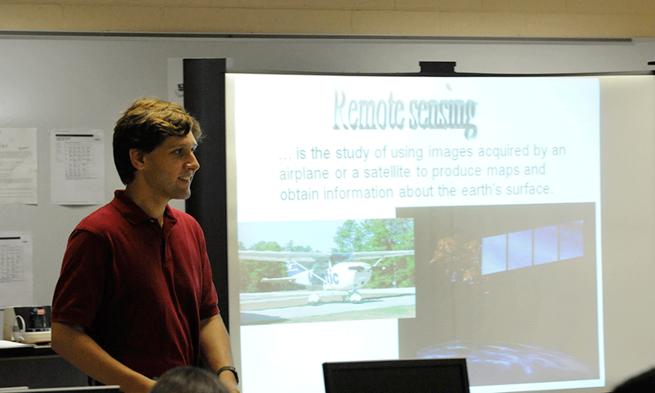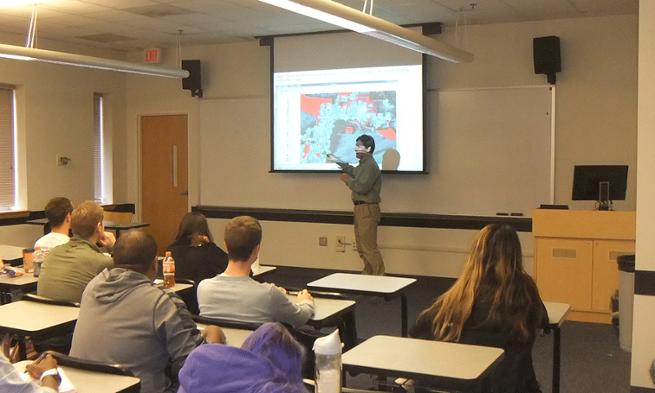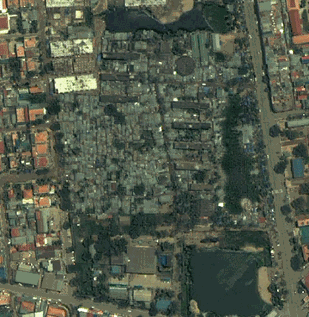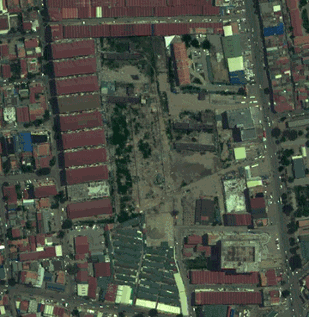Being the change on the other side of the globe
Science and Technology
ISAT Geographic Science professor finds unique way to aid those in need in Cambodia
By Emily Tait (’15)
Trying to improve lives
Life in many developing countries around the world is often typified by government corruption, poverty, low standards of living and limited human rights. Rather than let such injustices pass before his eyes and do nothing, JMU Integrated Science and Technology professor, Zack Bortolot, stepped forward to help.
For the past 20 years, the Cambodian government has forcibly evicted thousands of residents in the city of Phnom Penh from their homes, often without compensation. These people have no other choice but to move into low-quality dwellings far outside the city center where they have limited access to employment, medical care and education.
'These people have no other choice but to move into low-quality dwellings far outside the city center where they have limited access to employment, medical care and education.'
Bortolot’s involvement with a volunteer organization known as GISCorps, which is made up of geospatial professionals who try to improve the lives of people throughout the world, connected him to two organizations that were immersed in work in Cambodia—Amnesty International and a local non-governmental organization, Sahmakum Teang Tnaut, or STT.

Documenting evictions
STT have been collecting on-the-ground survey data on the number of families evicted and have been collecting GPS data on the locations of the eviction areas since 1997. Bortolot’s role in this research included independently validating the survey data to ensure that the number of evicted families was accurate, and providing visuals to show the evictions via satellite images that he composed, one from 2005 and one from 2012.
“Coming up with an estimate of the number of families evicted (rather than just the number of buildings) and producing confidence intervals was really challenging for me, and it required me to delve into a lot of studies that are well outside my area of expertise. …Overall the project took up pretty much my entire summer last year and quite a bit of time over the Thanksgiving and Christmas breaks.”

While Bortolot endured long hours of intense research, the team in Cambodia faced other challenges. “Over the course of six years, Phnom Penh changed more than many cities in the U.S. have changed over the past 60 years,” he says. Also, he had difficulties identifying where individual houses ended since structures often consisted of multiple sections of roof joined together. Because of this, he was in close comunication with STT workers on the ground throughout the project to obtain local expertise in interpreting images, and to survey people in areas that were similar to the eviction areas in order to get accurate data on the average number of families per home.
'Concepts and techniques discuss[ed] in class may at first seem abstract and theoretical [but] can be used to solve real world problems and improve the lives of real people.'
Despite these setbacks, Bortolot and his team were able to successfully complete their project and determined that their satellite estimates on the number of families evicted were within one percent of the estimates obtained on the ground. Bortolot explained the importance of this discovery, “This is exceptionally gratifying, and I think and hope it will dispel any doubts about the scale of the evictions. It was truly shocking to see an area with hundreds and hundreds of little homes…be reduced to a barren area or an area with luxury villas in just a few years.”

A way to Be the Change
Bortolot expressed his deepest gratitude toward JMU for support of his research abroad. “I was always strongly encouraged to work on the project, which I think reflects highly on JMU’s values and helps show why JMU is so different from many universities.”
Bortolot has been able to transform what he learned in Cambodia and apply it to his teaching at the university as well. “I have really enjoyed sharing my experience with the students in my classes since I think it’s a great example of how the concepts and techniques I discuss in class, which may at first seem abstract and theoretical, can be used to solve real world problems and improve the lives of real people.”
His work in Cambodia may just be one tiny drop in an ocean of change. Nevertheless, Bortolot’s involvement had an impact on Cambodians and is an example to the JMU community of a novel, positive way to influence the world. “I was inspired to work on this project because I really think it has a far greater potential to improve the quality of people’s lives than any work I have ever done,” he says. “I hope that it will allow me to ‘Be the Change’.”
